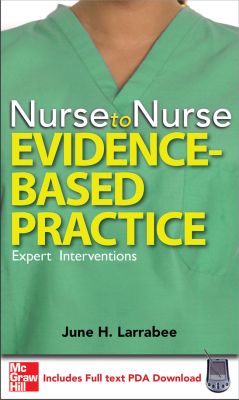Nurse to Nurse Evidence-Based Practice
Step 1. Download Adobe Digital Editions Both PC and Mac users will need to download Adobe Digital Editions to access their eBook. You can download Adobe Digital Editions at Adobe's website here.
Step 2. Register an Adobe ID if you do not already have one. (This step is optional, but allows you to open the file on multiple devices) Visit account.Adobe.com to register your Adobe account.
Step 3: Authorize Adobe Digital Editions using your Adobe ID. In Adobe Digital Editions, go to the Help menu. Choose “Authorize Computer.”
Step 4: Open your file with Adobe Digital Editions. Once you’ve linked your Adobe Digital Editions with your Adobe ID, you should be able to access your eBook on any device which supports Adobe Digital Editions and is authorized with your ID. If your eBook does not open in Adobe Digital Editions upon download, please contact customer service
Chapter 1 The journey to excellence in patient care
Excellence as a goal in nursing care: ethical and clinical considerations
Factors influencing the ability to give excellent care
Individual factors influencing the ability to give excellent care
Organization factors influencing the ability to give excellent care
System factors influencing the ability to give excellent care
Using knowledge to achieve excellence in care
Target audience and plan of the book
Chapter 2 The Model for Evidence-Based Practice Change
Overview of theoretical and empirical background
Overview of the steps in the model
Testing of the model
Chapter 3 Step 1: Assess the need for change in practice
Include stakeholders
Collect internal data about current practiceCompare internal data with external dataIdentify problemChapter 4 Step 2: Link problem, interventions, and outcomes
Use standardized classification systems and language
Identify potential interventionsSelect outcome indicators
Chapter 5 Step 3: Synthesize the best evidence
Search research literature related to major variables
Critique and weigh the evidence
Synthesize best evidence
Assess feasibility, benefits, and risk of new practice
Chapter 6 Step 4: Design practice change
Define proposed change
Identify needed resources
Plan implementation process
Define outcomesChapter 7 Step 5: Implement and evaluate change in practice
Pilot study demonstration
Evaluate process and outcomes
Decide to adapt, adopt, and reject practice change
Chapter 8 Step 6: Integrate and maintain change in practice
Communicate recommended change to stakeholders
Present staff inservice education on change in practice
Integrate into standards of practice
Monitor process and outcomes periodically
Glossary
Appendices
Sample Forms
Websites List
Select outcome indicators
Chapter 5 Step 3: Synthesize the best evidence
Search research literature related to major variables
Critique and weigh the evidence
Synthesize best evidence
Assess feasibility, benefits, and risk of new practice
Chapter 6 Step 4: Design practice change
Define proposed change
Identify needed resources
Plan implementation process
Define outcomesChapter 7 Step 5: Implement and evaluate change in practice
Pilot study demonstration
Evaluate process and outcomes
Decide to adapt, adopt, and reject practice change
Chapter 8 Step 6: Integrate and maintain change in practice
Communicate recommended change to stakeholders
Present staff inservice education on change in practice
Integrate into standards of practice
Monitor process and outcomes periodically
Glossary
Appendices
Sample Forms
Websites List
A unique "mentor in a pocket" handbook covering one of the most important trends in nursing today
From the co-creator of the Model for Change to Evidence-Based Practice comes the first portable guide to evidence-based practice for direct care nurses in any healthcare setting.
Part of McGraw-Hill's Nurse to Nurse series, this title includes PDA download of the entire text, case studies, and explicit step-by-step instructions on how to apply the Model for Evidence-Based Practice Change. Coated flex-binding repels stains.
The new Nurse to Nurse series is specifically designed to simulate the teaching experience nurses learn best from: trusted mentors carefully explaining what they must do in specific clinical situtions. Written in a consistent, single-author voice, this series brings the wisdom and experience of some of the foremost experts to non-specialist nurses in clinical care.

